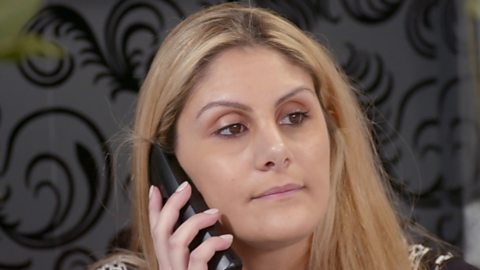Asking the best questions
Watch the video to find out more.
Speaker 1: (TO AUDIENCE) I have an appointment with a client for a facial.
Before we do anything, we have a consultation where I ask a series of very focused questions.
(TO OTHER PEOPLE) OK, so I’m going ask you a few questions.
Do you have any allergies or skin conditions?
Speaker 2: No.
Speaker 1: And on any current medication?
Speaker 2: No.
Speaker 1: (TO AUDIENCE) During the consultation I handwrite my notes very quickly.
I only write the essential information.
It’s really important that I catch everything and make sure the notes are really clear.
(TO OTHER PEOPLE) So just to summarise, you’ve got no skin conditions or allergies, on no current medication, only use a basic moisturiser.
You’d like to focus on your frown lines.
(SPEAKER 2 NODS)
(TO AUDIENCE) After the consultation I write up my notes onto a record card in more detail.
Speaker 1: I use full sentences so they can be read fully and clearly by another consultant.
Turn the notes into full sentences
Test your knowledge with this activity.
Choice of language at work
Watch the video to find out more.
Speaker 1: (TO AUDIENCE) Throughout the treatment I explain clearly what is happening, what tool I’m using, what products I’m putting on.
(TO OTHER PEOPLE) So we’re going cleanse your face first, take any makeup off.
(TO AUDIENCE) I change the way I move and speak according to what situation I’m in.
(TO OTHER PEOPLE) OK, so this is just the cleanser.
(TO AUDIENCE) During the facial the client’s eyes are closed.
I want to make sure that the client is comfortable and relaxed.
(TO OTHER PEOPLE) Are you comfortable there?
Speaker 2: Yes, thank you.
Speaker 1: (TO AUDIENCE) I move gently, I let them know before I have contact with them.
I speak softly. (TO OTHER PEOPLE) So I’m just going apply some warm water and sponges just to get rid of any of that cleanser.
(TO AUDIENCE) I don’t make small talk by asking them questions about their day.
(TO OTHER PEOPLE) All you’re going to feel is a slight suction.
(TO AUDIENCE) What I say and how I say it will have a huge impact on the client’s experience.
What would you say?
Test your knowledge with this activity.
Speaking persuasively
Watch the video to find out more.
Speaker 1: OK, so how was that facial?
Speaker 2: Nice, thank you. Very refreshing.
Speaker 1: (TO AUDIENCE) After a treatment I recommend a good skincare routine for the client.
I always start by being positive and paying them a compliment.
(TO OTHER PEOPLE) You’ve got really great skin but you need to look after it.
You need to be using a cleanser every morning.
(TO AUDIENCE) When offering professional advice, it’s always good to make a personal connection.
I talk about how our skin type is similar or how we use the same product.
(TO OTHER PEOPLE) You’ve actually got quite a similar skin type to my mum.
I’ve recommended a product to her that she can use, and it works wonders on her skin, she loves it.
The moisturiser is light, firm and effective.
It’s infused with vitamins. You can use it on a daily basis, morning and evening.
(TO AUDIENCE) I’m able to put the information across to the client persuasively because I’ve done my research.
I know all the facts and figures and I believe what I am saying is true.
I’m offering my own opinion and it feels personal and genuine.
(TO OTHER PEOPLE) So I’ll leave you with a sample and if you like we can book in another one in two weeks’ time.
Speaker 2: OK.
Find the persuasive sentences
Test your knowledge with this activity.
More on Hair and beauty
Find out more by working through a topic
- count4 of 5
